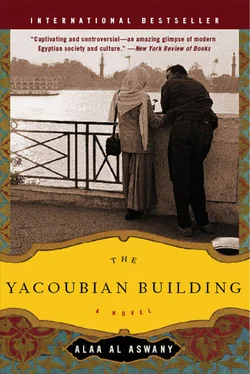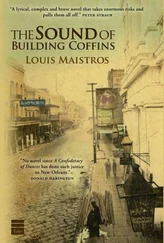Alaa Al Aswany - The Yacoubian Building
Здесь есть возможность читать онлайн «Alaa Al Aswany - The Yacoubian Building» весь текст электронной книги совершенно бесплатно (целиком полную версию без сокращений). В некоторых случаях можно слушать аудио, скачать через торрент в формате fb2 и присутствует краткое содержание. Год выпуска: 2006, ISBN: 2006, Издательство: Adobe Acrobat eBook Reader, Жанр: Современная проза, на английском языке. Описание произведения, (предисловие) а так же отзывы посетителей доступны на портале библиотеки ЛибКат.
- Название:The Yacoubian Building
- Автор:
- Издательство:Adobe Acrobat eBook Reader
- Жанр:
- Год:2006
- ISBN:978-0-06-087813-9
- Рейтинг книги:5 / 5. Голосов: 1
-
Избранное:Добавить в избранное
- Отзывы:
-
Ваша оценка:
- 100
- 1
- 2
- 3
- 4
- 5
The Yacoubian Building: краткое содержание, описание и аннотация
Предлагаем к чтению аннотацию, описание, краткое содержание или предисловие (зависит от того, что написал сам автор книги «The Yacoubian Building»). Если вы не нашли необходимую информацию о книге — напишите в комментариях, мы постараемся отыскать её.
The Yacoubian Building — читать онлайн бесплатно полную книгу (весь текст) целиком
Ниже представлен текст книги, разбитый по страницам. Система сохранения места последней прочитанной страницы, позволяет с удобством читать онлайн бесплатно книгу «The Yacoubian Building», без необходимости каждый раз заново искать на чём Вы остановились. Поставьте закладку, и сможете в любой момент перейти на страницу, на которой закончили чтение.
Интервал:
Закладка:
In 1952 the Revolution came and everything changed. The exodus of Jews and foreigners from Egypt started, and every apartment that was vacated by reason of the departure of its owners was taken over by an officer of the armed forces, who were the influential people of the time. By the 1960s, half the apartments were lived in by officers of various ranks, from first lieutenants and recently married captains all the way up to generals, who would move into the building with their large families. General El Dakrouri (at one point director of President Muhammad Naguib’s office) was even able to acquire two large apartments next door to one another on the tenth floor, one of which he used as a residence for himself and his family, the other as a private office where he would meet petitioners in the afternoon.
The officers’ wives began using the iron rooms in a different way: for the first time they were turned into places for the stewards, cooks, and young maids that they brought from their villages to serve their families to stay in. Some of the officers’ wives were of plebeian origin and could see nothing wrong in raising small animals (rabbits, ducks, and chickens) in the iron rooms, and the West Cairo District’s registers saw numerous complaints filed by the old residents to prevent the raising of such animals on the roof. Owing to the officers’ pull, however, these always got shelved, until the residents complained to General El Dakrouri, who, thanks to his influence with the former, was able to put a stop to this unsanitary phenomenon.
In the seventies came the “Open Door Policy” and the well-to-do started to leave the downtown area for El Mohandiseen and Medinet Nasr, some of them selling their apartments in the Yacoubian Building, others using them as offices and clinics for their recently graduated sons or renting them furnished to Arab tourists. The result was that the connection between the iron rooms and the building’s apartments was gradually severed, and the former stewards and servants ceded them for money to new, poor residents coming from the countryside or working somewhere downtown who needed a place to live that was close by and cheap.
This transfer of control was made easier by the death of the Armenian agent in charge of the building, Monsieur Grigor, who used to administer the property of the millionaire Hagop Yacoubian with the utmost honesty and accuracy, sending the proceeds in December of each year to Switzerland, where Yacoubian’s heirs had migrated after the Revolution. Grigor was succeeded as agent by Maitre Fikri Abd el Shaheed, the lawyer, who would do anything provided he was paid, taking, for example, one large percentage from the former occupant of the iron room and another from the new tenant for writing him a contract for the room.
The final outcome was the growth of a new community on the roof that was entirely independent of the rest of the building. Some of the newcomers rented two rooms next to one another and made a small residence out of them with all utilities (latrine and washroom), while others, the poorest, collaborated to create a shared latrine for every three or four rooms, the roof community thus coming to resemble any other popular community in Egypt. The children run around all over the roof barefoot and half naked and the women spend the day cooking, holding gossip sessions in the sun, and, frequently, quarreling, at which moments they will exchange the grossest insults as well as accusations touching on one another’s honor, only to make up soon after and behave with complete goodwill toward one another as though nothing has happened. Indeed, they will plant hot, lip-smacking kisses on each other’s cheeks and even weep from excess of sentiment and affection.
The men pay little attention to the women’s quarrels, viewing them as just one more indication of that defectiveness of mind of which the Prophet — God bless him and grant him peace — spoke. These men of the roof pass their days in a bitter and wearisome struggle to earn a living and return at the end of the day exhausted and in a hurry to partake of their small pleasures — tasty hot food and a few pipes of tobacco (or of hashish if they have the money), which they either smoke in a water-pipe on their own or stay up to smoke while talking with the others on the roof on summer nights. The third pleasure is sex, in which the people of the roof revel and which they see nothing wrong with discussing frankly so long as it is of a sort sanctioned by religion. Here there is a contradiction. Any of the men of the roof would be ashamed, like most lower-class people, to mention his wife by name in front of the others, referring to her as “Mother of So-and-so,” or “the kids,” as in “the kids cooked mulukhiya today,” the company understanding that he means his wife. This same man, however, will feel no embarrassment at mentioning, in a gathering of other men, the most precise details of his private relations with his wife, so that the men of the roof come to know almost everything of one another’s sexual activities. As for the women, and without regard for their degree of religiosity or morality, they all love sex enormously and will whisper the secrets of the bed to one another, followed, if they are on their own, by bursts of laughter that are carefree or even obscene. They do not love it simply as a way of quenching lust but because sex, and their husbands’ greed for it, makes them feel that despite all the misery they suffer they are still women, beautiful and desired by their menfolk. At that certain moment when the children are asleep, having had their dinner and given praise to their Lord, and there is enough food in the house to last for a week or more, and there is a little money set aside for emergencies, and the room they all live in is clean and tidy, and the husband has come home on Thursday night in a good mood because of the effect of the hashish and asked for his wife, is it not then her duty to obey his call, after first bathing, prettying herself up, and putting on perfume? Do these brief hours of pleasure not furnish her with proof that her wretched life is somehow, despite everything, blessed with success? It would take a skilled painter to convey to us the expressions on the face of a woman on the roof of a Friday morning, when, after her husband has gone down to perform the prayer and she has washed off the traces of love-making, she emerges to hang out the washed bedding — at that moment, with her wet hair, her flushed complexion, and the serene expression in her eyes, she looks like a rose that, watered with the dew of the morning, has arrived at the peak of its perfection.

The darkness of night was receding, heralding a new morning, and a dim, small light on the roof shone from the window of the room belonging to Shazli the doorkeeper, where his teenage son Taha had spent the night sleepless with anxiety. Now he performed the dawn prayer, plus the two superrogatory prostrations, then sat on the bed in his white gallabiya reading from The Book of Answered Prayer and repeating in a frail whisper in the silence of the room, “O God, I ask You for whatever good this day may hold and I take refuge with You from whatever evil it may hold and from any evil I may meet within it. O God, watch over me with Your eye that never sleeps and forgive me through Your power, that I perish not; You are my hope. My Lord, Master of Majesty and Bounty, to You I direct my face, so bring Your noble face close to me and receive me with Your unalloyed forgiveness and generosity, smiling on me and content with me in Your mercy!”
Taha continued to read the prayers until the light of morning shone into the chamber and little by little life started to stir in the iron rooms — voices, cries, laughter and coughing, doors shutting and opening, and the smell of hot water, tea, coffee, charcoal, and tobacco. For the inhabitants of the roof it was just the start of another day; Taha el Shazli, however, knew that on this day his fate would be decided forever. After a few hours, he would present himself for the character interview at the Police Academy — the last hurdle in the long race of hope. Since childhood, he has dreamed of being a police officer and has devoted all his efforts to realizing that dream. He has applied himself to memorizing everything for the general secondary examination and as a result obtained a score of 98 percent (Humanities) without private tutoring (apart from a few review groups at the school, for which his father had only just been able to come up with the money). During summer vacations he joined the Abdeen Youth Center (for ten pounds a month) and put up with the exhausting body-building exercises in order to acquire the athletic physique that would allow him to pass the physical fitness tests at the Police Academy.
Читать дальшеИнтервал:
Закладка:
Похожие книги на «The Yacoubian Building»
Представляем Вашему вниманию похожие книги на «The Yacoubian Building» списком для выбора. Мы отобрали схожую по названию и смыслу литературу в надежде предоставить читателям больше вариантов отыскать новые, интересные, ещё непрочитанные произведения.
Обсуждение, отзывы о книге «The Yacoubian Building» и просто собственные мнения читателей. Оставьте ваши комментарии, напишите, что Вы думаете о произведении, его смысле или главных героях. Укажите что конкретно понравилось, а что нет, и почему Вы так считаете.












